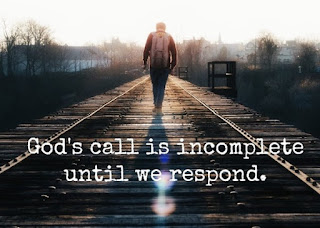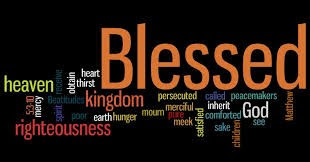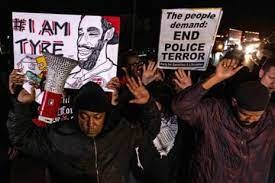[Video of the delivery of this sermon is available at the link below beginning at 27:00 in the recording]
https://www.youtube.com/watch?v=i8QLlcNpXvk
“Consider your own calling, brothers and sisters.”
Today is the fourth
Sunday of Epiphany. We celebrate a season when new understandings, new
insights, new ways of being human are presenting themselves. And our lectionary
this morning gives us much to consider in this Epiphany season.
Vocations – G-d Calls Us
Today’s letter to the Corinthians contains a classic Pauline concept that I have always found to be right on target. Paul is talking about what constitutes wisdom and how to know it when we see it. Among his words he says the following: “Consider your own calling, brothers and sisters.
The Pauline notion of
calling, vocation, is an essential foundation of what it means to be a
disciple, a follower of Jesus. This understanding of vocation means that
everyone, everywhere, and in everything fulfills their own life callings in
response to that to which G-d calls them.
Martin Luther would
pick up this verse and run with it in his writings. Like no theologian before
him, he insisted on the dignity and value of all labor. Luther’s famous
assertion is that the farmer shoveling manure and the maid milking her cow
please God as much as the minister preaching or praying. He was clear that Godly
vocations are far more than just callings to ordained ministry.
Luther had seized upon a
central truth about human society: We all rely on one another to do that to
which we are called in order for our lives together to work. While my own
callings have been to law, religion and academia, my ability to answer those
callings is only possible because there are those who respond to their callings
as police officers and fire fighters, grocery store clerks, farm workers,
accountants and plumbers. As Luther observes, all of these callings, when done
to the best of the ability of the worker, reflects the glory of G-d. We are in
Luther’s debt for this wisdom.
Our lessons this morning give us a roadmap. The Sermon on the Mount in Matthew’s Gospel lays out the values of the Jesus Movement as the Matthean community understood them. It’s important to note that there is a similar version of these words in Luke’s Gospel delivered from the seashore of Galilee and often called the Sermon on the Plain. But it is Matthew’s version we are considering today.
It comes in this fifth
chapter of Matthew’s Gospel at a critical point in Jesus’ life. He has just
been baptized at the Jordan River followed by his wrestling with the Satan of
human temptations in the desert. Upon his emergence from the wilderness, he will
learn that John the Baptizer, his teacher, has been taken into custody by King
Herod and will eventually die at his hands. John’s disciples have begun to look
for a new leader and many will end up in the Jesus movement.
Now is the time for Jesus to begin his own ministry of teaching and healing. And he begins that ministry with the Sermon on the Mount. Here Jesus articulates the values that mark the Kingdom of G-d. It will be the first of five sets of teachings Matthew reports, much like the five books of the Torah, reflecting Matthew’s interpretation of the life of Jesus through the lenses of the Hebrew tradition. These teachings will begin with this Sermon on the Mount and end with a prayer which pieces together Hebrew scripture that will come to be known as the Lord’s Prayer.
Values and Rule Driven
Reasoning
There is a movement in
America today among our more conservative brothers and sisters to post the Ten
Commandments in public spaces, particularly in courthouses. It is part of a
profoundly misguided effort to convince us that America has always been a Christian
nation, an assertion lacking any historical basis. Ironically, while the
Commandments reflect the rule-driven thinking of the Hebrew law, it is the Sermon
on the Mount that summarizes the Way of Jesus. But it is written in broad terms,
laying out values that should shape our attitudes, words and behaviors as well
as critiquing what we actually do think, say and do.
Rule driven thinking is a much lower level of moral reasoning than wrestling with values. We teach children the rules. But we expect adults to make moral decisions upon the values we have instilled in them. We have to wonder what difference it would make if it was the values of the Sermon on the Mount that graced our courtroom walls and not the specific rules of the 10 Commandments.
Let’s consider what those values might be for a second. “Blessed are the poor in spirit. For theirs is the kingdom of heaven.” Who are the poor in spirit in our lives? Who suffers from doubts about their own value as human beings, perhaps treating their depression with medication and therapy?
Drained Souls of the Poor
in Spirit
I’ve recently become acutely aware of a group of my fellow children of G_d who merit consideration. While I am a cis-gendered male who has never wondered about my sex, I am increasingly aware that there are those whose experience of themselves is very different from my own. I admit up front that I do not understand their struggle. But it doesn’t take much to recognize that for them it is real and it is often painful.
I’ve asked myself what would it be like to feel as if the gender that was assigned to me at birth did not match the gender I experienced internally? What would it be like to have people telling me that my own experience is false, perhaps even immoral? What would it be like to watch my parents struggle to support me in a hostile culture in which they worried about the safety of their child? What would it be like to be the target of laws passed against my person that would govern things as intimate as where I was able to go to the bathroom or even discuss with others who I feel I really am?
I suspect these are people whose spirits are drained. And so I ask myself, how can these poor in spirit come to be blessed? And what in my response to them might prove to be a blessing and not simply one more weight for them to carry?
Another of these beatitudes,
these blessings that Matthew reports Jesus saying, asserts that the meek are
blessed. Indeed, he says, they will inherit the earth. One of my favorite
bumper stickers today simply reads “The Meek Don’t Want It.” At some level, you
have to wonder who would want a world that has been exhausted of its resources
to feed the insatiable appetites of the powerful while trashing what was left.
But Matthew is making a point here. It is not the powerful and the privileged in our world who merit the attention of the followers of Jesus. It’s the little ones whom Jesus loved, living into their callings in everyday lives, those who don’t make headlines with tell-all revelations about royal families or meltdowns of crypto currency.
The Defining Values of
the Sermon on the Mount
The values of the Sermon on the Mount are the defining values of the Jesus movement. They include
· the uplifting of the poor in spirit
· the comforting of the mourning
· the valuing of the meek
· the standing in solidarity with those hungering for justice
· the willingness to respond to suffering with mercy.
These values include the need to constantly reflect on our own souls to see the places where our hearts are not pure. And they call us to be peace makers in a world where might makes right is the common but profoundly misguided understanding of how to order our collective lives.
Little wonder these values do not grace our courtroom walls or the halls of our legislative bodies. Indeed, Matthew’s Jesus has no illusions about how difficult it is to live out these values. Not only is it hard to know with certainty what any of these beatitudes might mean in our immediate lives, Jesus also recognizes that if these values are pursued, their practitioners will no doubt draw fire from those whose mediocrity of spirit is revealed by the living out of those values. There is much truth in the old saying that “No good deed goes unpunished.” And yet, as followers of Jesus, these are the values we are called to incarnate in our own lives and in the world.
So, who are the poor in spirit in our lives? What within our own spiritual lives is impoverished? Who are the mourners in our lives? How can we be a source of comfort to them? Where in our lives might we need comfort in our own mourning? Who are the meek in our lives? Might we be one of them? Where is mercy needed in our lives, for ourselves and others? And what injustices in our world demand our willingness to confront them, even if doing so makes us uncomfortable.
Especially if it make us uncomfortable.
A Prophet Offers Some Guidance
Finally, how do we assess our efforts to live into these callings? Again, our lessons today provide us some insights. The prophet Micah poses the question “What does the Lord require of you?” – i.e., what is G-d calling us to do? Micah then answers his own question with the following: Do justice, love kindness, walk humbly with God. If we are managing to do those things, we are living into our calling to follow Jesus laid out in the Sermon on the Mount.
Bear in mind, it is tempting to hear all this and throw up our hands, lamenting that this is too hard, too vague - how am I supposed to hit such a nebulous target? An expansion of this verse from Micah by Rabbi Rami Shapiro offers us both clarification as well as encouragement and I close with his words. Let us pray:
Holy One, may we not be daunted by the enormity of the world's grief. Help us to act justly, now. Help us to love mercy, now. Help us to walk humbly now. And may we always remember that while we are not obligated to complete the work ourselves, we are never free to abandon it. AMEN.
Sermon preached on Epiphany
IV, January 29, 2023, at St. Richard’s Episcopal Church, Winter Park, Florida
++++++++++++++++++++++++++++++++++++++++++++++++++
Harry Scott Coverston
Orlando, Florida
If the unexamined life
is not worth living, surely an unexamined belief system, be it religious or
political, is not worth holding. Most things worth considering do not come in
sound bites.
Those who believe
religion and politics aren't connected don't understand either. – Mahatma Gandhi
For what does G-d
require of you but to do justice, and to love kindness, and to walk humbly with
your G-d? - Micah
6:8, Hebrew Scriptures
Do not be daunted by the
enormity of the world's grief. Do justly, now. Love mercy, now. Walk humbly
now. You are not obligated to complete the work, but neither are you free to
abandon it. - Rabbi
Rami Shapiro, Wisdom of the Jewish Sages (1993)
© Harry Coverston,
2022
++++++++++++++++++++++++++++++++++++++++++++++++++
































